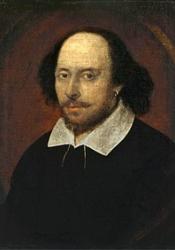William Shakespeare (1564-1616) (Historical) (Chapter 2 page 88)
William Shakespeare is widely considered to be the greatest playwright of the English language. He created over 37 plays including "Romeo and Juliet," "Hamlet," "A Midsummer Night's Dream," and many more ("William Shakespeare"). Shakespeare was mostly active during the Elizabethan age and experienced great success and was considered by many of his contemporaries to be great. In fact, in the First Folio edition of Shakespeare's collection another famous dramatist. Ben Jonson, commented that "He was not of an age, but for all time" ("William Shakespeare").
Virginia Woolf was undeniably familiar with Shakespeare's works. In fact Woolf wrong in her feminist essay "A Room of One's Own" about a fictional "Judith Shakespeare" that was of equal talent with William Shakespeare (Merrigan). However, despite being as gifted as William would be, Judith is denied an opportunity to display her talents to the masses because of her identity as a woman.
In Orlando, Woolf mentions Shakespeare several times throughout different chapters often in conversation between Orlando and Nicholas Greene. While Greene at first is dismissive of Shakespeare he later calls "Marlowe, Shakespeare, Ben Jonson - those were the giants." (Woolf 162). Orlando themself think about Shakespeare's lines at times as great. As Woolf and Orlando write their poems they would have undoubtedly been comparing themselves to Shakespeare as they grapple with what type of legacy their work will have.
225 words
Merrigan, Tara. “How Virginia Woolf Used Fiction to Make a Persuasive Case for Equality.” Medium, Poetry & Politics, 22 July 2019, medium.com/poetry-politics/how-virginia-woolf-used-fiction-to-make-a-persuasive-case-for-equality-f8138379fd66.
“William Shakespeare.” History.com, A&E Television Networks, 3 Oct. 2011, www.history.com/topics/british-history/william-shakespeare.
Woolf, Virginia. Orlando (Vintage Classics). Random House. Kindle Edition.

